When going on a hike, you need to consider your hiking boots’ weight. Why? The weight of these hiking boots determines several factors of your hike like the maximum protection and support your feet need.
This is why there have been many questions surrounding hiking boots, especially their weight. At different times, you have probably also been wondering if it’s okay for you to wear heavy or lightweight boots, and which terrain best suits them.
Sometimes, you even wonder which hiking boots you should wear for different weather conditions. However, deciding which hiking boots to wear wouldn’t be a problem once you can match their weight with the appropriate weather and terrain use.
So, is it okay for you to wear 2lbs or 3lbs boots or a higher weight? We have answers to the dilemma you’re facing. And in this article, we’ll tell you about the different weight ranges, their pros and cons, and the terrain and weather they’re suitable for.
Let’s find out together.
Contents
How Heavy Should Hiking Boots Be?

Typically, hiking boots are pretty heavy compared to regular flat footwear. And this weight is due to the kind of structure it possesses. For instance, manufacturers tend to ensure that they can provide enough protection and support, which can increase the weight.
Generally, hiking boots’ weight starts from around 2lbs and could go as high as 3lb, while some weigh higher.
When you also consider how easy or challenging the terrain is, you wonder which weight would be a considerable amount that won’t tire you or slow you down.
Of course, different factors contribute to hiking boots’ weight, but which weight should you consider okay for hiking? Some weight could wear you down, while others could be just what you need for the hiking terrain and weather.
So, let’s take an in-depth look at the different hiking boots’ weights.
1. From 2lbs
Some hiking boots weighing 2lbs usually get considered lightweight hiking boots. Personally, this is the ideal weight for hiking boots because they are not heavy and they tend to provide enough support for your feet.
However, this amount of weight is primarily okay if you’re hiking on simple and plain terrain. Because you can hike for as long as you want without worrying about it tiring you out.
Also, you might find these 2lbs hiking boots suitable for warm weather. So why should you (or not) wear 2lbs hiking boots?

Pros
Lightweight
Of course, weight is key when it comes to hiking. Have you heard of the saying that one pound on your feet equals an extra five pounds on your back?
That is, the weight could make a difference to your hiking experience. So, lightweight means they’ll be easy to carry; it won’t tire you quickly, plus, you’ll use less energy.
Secure feet
Generally, 2lbs hiking boots help protect and secure the feet. So you can be sure that they will cover and support your feet while you’re hiking.
Good traction
Most hiking boots have good traction, so they help your feet stand firm on different terrains. In addition, they protect you from slipping when you’re hiking. So, you don’t have to wear heavyweight hiking boots to get the protection your feet need while hiking.
Stability
Manufacturers make lightweight boots from materials that make you stable when you are out hiking. So, you can feel balanced on the ground without having to drag heavyweight boots around all day.
Durability
Synthetic or leather hiking boots that weigh 2lbs have average durability of around 900 miles to 1,200 miles. So, they are more durable than trail runners; however, not as much as full-grain leather hiking boots, which are heavier.
Con
Less ankle support
Lightweight hiking boots provide less ankle support, especially if their design is low-cut or mid-cut. Therefore, they may not be suitable for rough or rocky terrain.
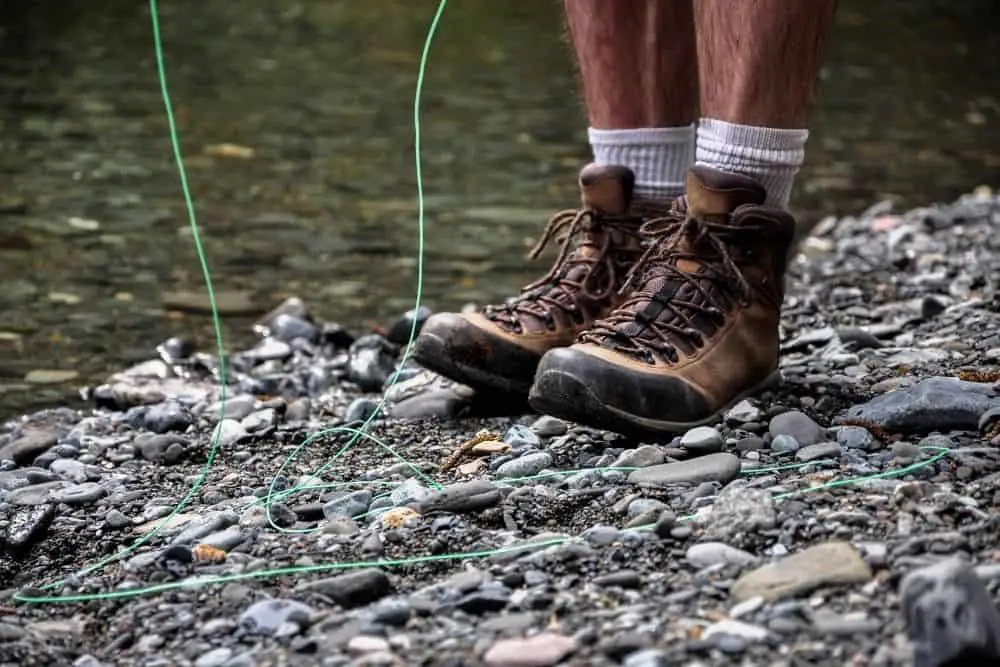
2. From 3lbs
People consider hiking boots that weigh 3lbs and above to be heavyweight. However, some hikers may still think of them as lightweight. Although they are heavier than 2 lbs hiking boots, they provide enough protection and support for your feet.
And the reason for the increased weight is likely due to the choice of material for the upper, extra padding, or added features like composite toe caps or insulation. Let’s delve right into the pros and cons of hiking boots that weigh between 3lbs and 3.9lbs.

Pros
Ankle support
3lbs hiking boots provide ample ankle support to help carry your weight while you hike. This is to keep your ankles well-supported and prevent twisting or dislocation. However, the ankle support on 3lbs hiking boots is pretty mild.
Good traction
Hiking boots weighing 3lbs tend to provide good traction on different terrains. This means you can wear them on slippery, wet, or snowy landscapes. In addition, they are also stable and ideal for hiking on loose and rocky terrains.
They are warm
The 3lbs leather hiking boots provide warmth for feet when you are out hiking. How?
The weight and added insulating materials will generate more heat on your feet. However, this design would be good during low temperatures because it will prevent your feet from freezing.
Durable
3lbs hiking boots tend to be more durable than their lightweight versions.
They usually have tougher upper materials and outsoles that don’t wear out real quickly. That is, you can wear them for a longer period, such as extended hikes.
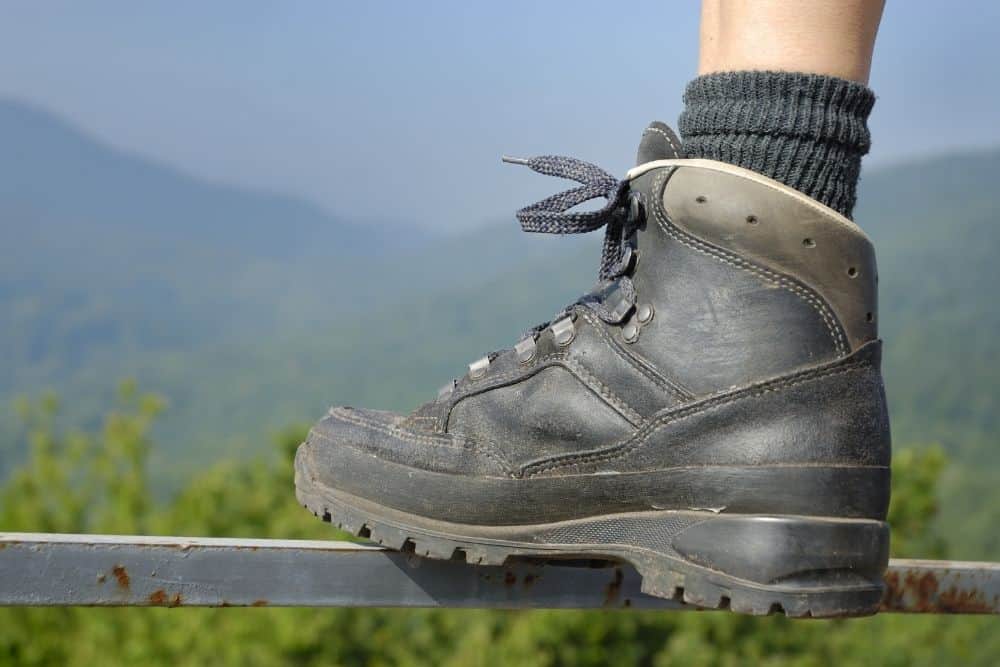
Cons
Heavy
One turnoff about 3 lbs hiking boots is that they are heavy. Their materials, outsoles, shanks, designs, and every other thing make them a bit heavy to carry.
Therefore, they could tire you quickly when hiking. These hiking boots tend to take up a lot of energy, especially when you are hiking on longer trips.
Personally, 3lbs hiking boots may not be the best fit when you want your hiking trip to be as relaxing as possible. Also, you may not need them if you’re not hiking on challenging terrains.
Not suitable for a warmer climate
Heavy hiking boots can be a poor choice during warmer climates. This is because their structure prevents them from being breathable, making your feet sweat when hiking.
One feature of the 3-lb hiking boots that will likely make them unsuitable for warmer climates would be the inclusion of insulation. Also, their weight could be a dealbreaker when the weather is hot.
Stiff upper
Another thing about 3lbs hiking boots is that they sometimes have a stiff upper. The stiffness is mostly due to the manufacturer’s plan to increase the durability of the hiking boot.
Manufacturers do this by using stronger materials like full-grain leather. Generally, most hiking boots’ weighing 3lbs or more will likely have uppers that feel stiff around the foot, causing discomfort when you’re hiking.
Long break-in
Heavyweight hiking boots take a long time to break in. Also, since their soles and uppers are quite stiffer than lightweight shoes, they’ll take a longer period to soften.
That is, you may have to wear them for an extended period or try other methods to soften them before you can feel comfortable in them.
They take longer to dry
Since their materials are pretty heavy, they may take longer periods to dry. So if they ever get soaked in water, beaten by rain, or you wash them, you’d have to wait for a long time for them to dry up.
3. From 4lbs
Yes, even though average hiking boots weigh between 2 lbs and 3 lbs, there are some that weigh as much as 4 lbs. These hiking boots are much heavier and stronger than 2lbs and 3lbs hiking boots.
They are usually heavy-duty hiking boots and are suitable for tougher hiking terrains. Also, they are good for heavy backpacking and mountaineering. Primarily, they tend to weigh 4lbs because of the added features they possess.
For instance, they will likely come with steel toe caps, Thinsulate insulation, extra padding, heavy upper material like full-grain leather. So, why should you or should you not wear them?

Pros
High-quality material
4lbs hiking boots are usually made from high-quality materials and with good construction. Manufacturers design them for the most challenging terrains, so you can wear them if you do much off-trail hiking.
Good traction
These heavyweight hiking boots provide excellent traction when hiking. Also, they ensure that your feet stand firm on rugged hiking trails, protecting you from falling on slippery terrains.
You can be sure to get protection for your feet when hiking on tough terrains and during cold or snowy weather.
Durable
Their materials, from uppers to insoles and outsoles, are durable, long-lasting, and can go for several long hiking trips. This is due to the strong rubber on the outsoles and PU or EVA-type insoles they possess.
Therefore, their outsoles won’t wear off after a few hiking trips, and their uppers don’t break from harsh conditions. Plus, 4lbs hiking boots tend to withstand harsh weather conditions and challenging terrains.
Sturdy and stable
They are sturdy, stable, and provide enough ankle support all through your hiking trip. In addition, manufacturers make every bit of the hiking boots part strong enough to give the right protection for your feet.
More so, they are solid and firm around your feet. If you need extra support when hiking, or when on a hike on challenging hiking terrains, you can wear 4lbs hiking boots.
They’re warm
They are super warm and provide sufficient warmth for your feet when you are out hiking. Plus, they can be perfect for cold weather or when it’s snowing outside.
Cons
Heavy
They are heavier than 2lbs and 3lbs hiking boots. Therefore, they will require a lot more energy to lift when hiking. As a result, you could get tired quickly when hiking.
Stiff
They can be very stiff around the feet. Manufacturers make them be firm around the feet, coupled with their materials, which make these hiking boots feel more rigid than lightweight ones.
Less breathable
4lbs hiking boots have less breathability compared to the 2lbs versions. Why? They tend to pack a lot of designs and materials such as Insulation or heavy padding that hinder easy breathability.
So, they can be frustrating and uncomfortable during warmer climates. Plus, these hiking boots allow only a little ventilation to get to your feet, so they may not suit you if you have sweaty feet.
Longer break-in period
They need serious breaking in before you can enjoy them fully. So you may have to do more and go the extra mile to make them soft and comfortable for you.
What makes hiking boots heavy?
Generally, hiking boots are heavier than regular walking shoes, and it’s because manufacturers make them for different purposes. Other than that, some other factors contribute to hiking boots’ heaviness. They are:
1. Boot upper
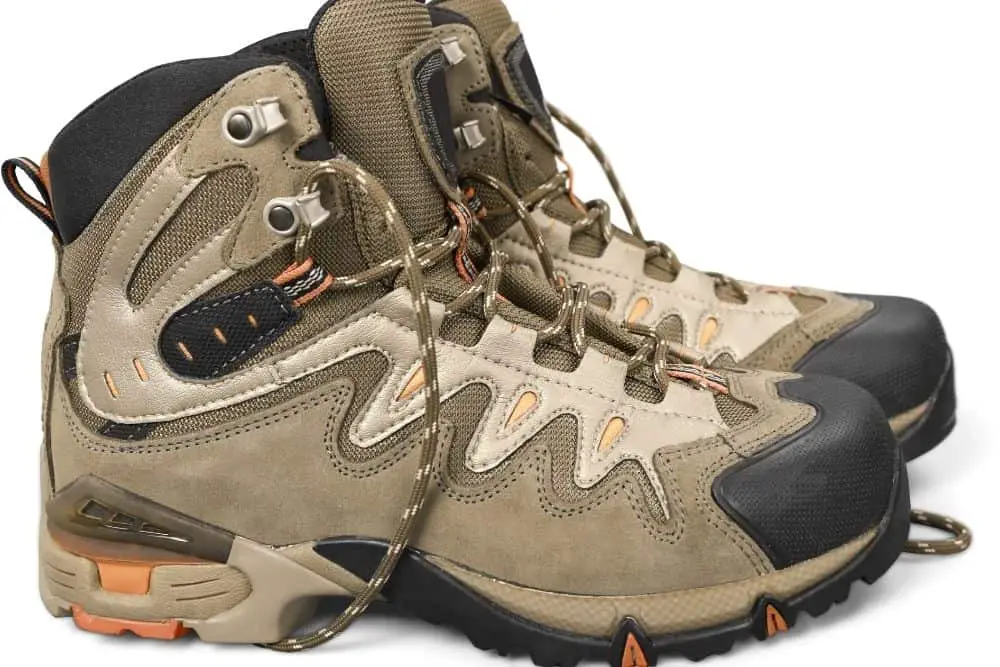
Hiking boot upper contribute to the weight of the boots. That is the materials with which manufacturers design them which tend to impact how heavy they are.
For instance, leather is heavier than other synthetic materials. This is because leather provides more protection, stiffness, and support for hikers. So, the tougher their texture, the heavier they are likely to weigh.
2. The outsole
Manufacturers make hiking boots’ outsoles from rubber, and they help contribute to the sturdiness and grip of your hiking boots. In addition, they help provide good traction when you’re hiking. These, however, contribute to the overall weight of hiking boots.
3. Shank
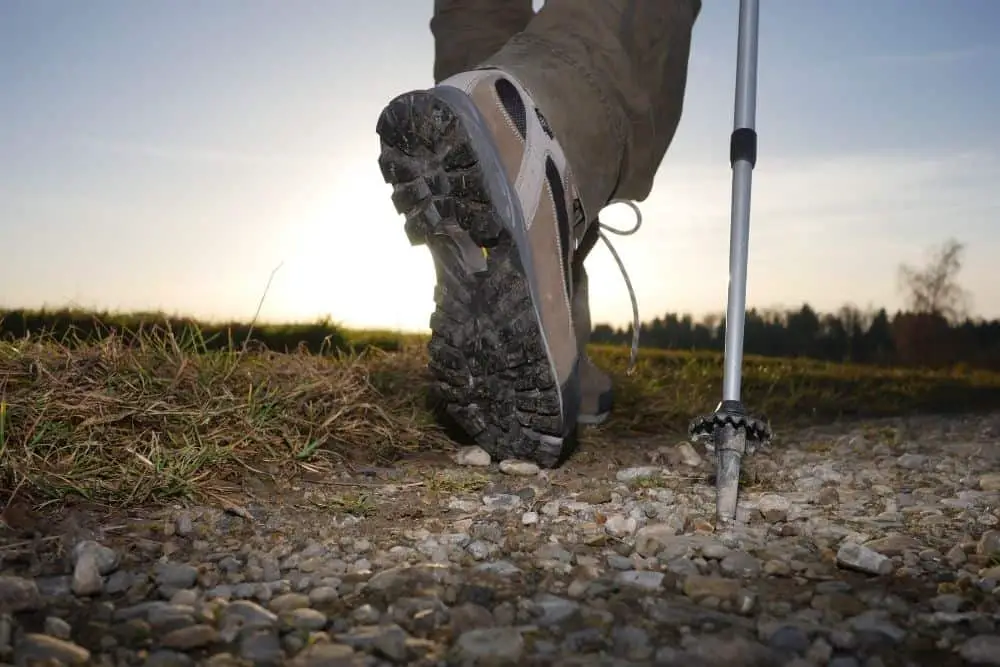
Manufacturers insert shanks between hiking boots’ insoles and outsoles to add more stiffness to the midsole. Also, it helps provide more support and stability when you’re hiking.
Their length differs, such that some cover the whole length of the midsoles while others only cover half of it.
For instance, a full-length shank will be heavier than a half-length shank. Also, hiking boots have different shank materials, depending on the kind of terrain you use them.
Although manufacturers make most hiking boots’ shanks from plastic, other footwear, like mountaineering boots, uses steel shanks. Of course, plastic is lighter than steel, so whichever shank a hiking boots pair has, it somewhat contributes to the weight.
4. Boot design
Hiking boots designs can also contribute to their weight. For example, Low-cut and mid-cut boots are lighter than high-cut boots.
You should know that low-cut and mid-cut hiker’s footwear doesn’t have as much ankle support and protection as high-cut hiking boots. So, if you want enough ankle support when hiking, you may have to bear a little more weight on your feet.
5. Toe Caps
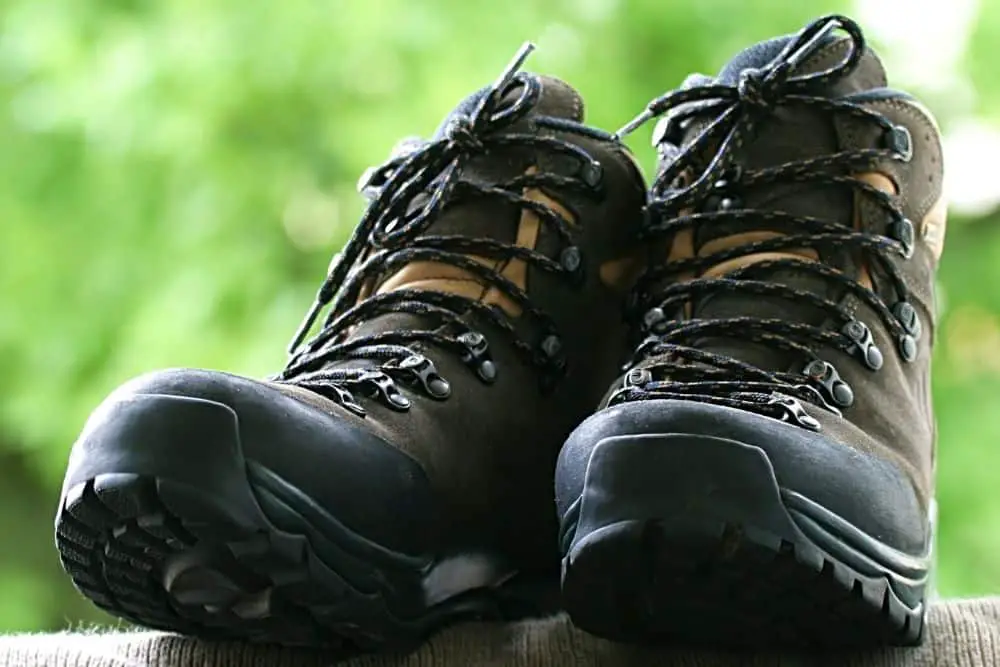
Of course, toe caps are great safety features of hiking boots, especially for people wearing them for activities that endanger the foot. However, they are among the huge contributors to weight increase in hiking boots.
Generally, in hiking boots, you have rubber, composite, and steel toe caps for protection. And you would agree that steel toe caps increase the weight greatly over the others. So, if you like your hiking boots lightweight, you might want to be wary of steel toe caps.
6. Insulation
Although not every hiking boot comes with insulation, the ones with them tend to weigh more. Why?
Insulated hiking boots usually come with more padding materials that increase the overall weight. For instance, insulated hiking boots have different levels of Thinsulate insulating materials, which contributes to the heavyweight feeling and experience.
How Can Hiking Boot Weights Affect You?
Hiking boots’ weight can affect your toes or ankles. That is, the stiffer or heavier they are, the more they are likely to make your toes or ankles hurt.
They may give too much ankle support that could lead to blisters and injuries around your ankles. Other times, it could be that there isn’t enough room for your legs, resulting in toe pains.
Which Weight Should You Go For?
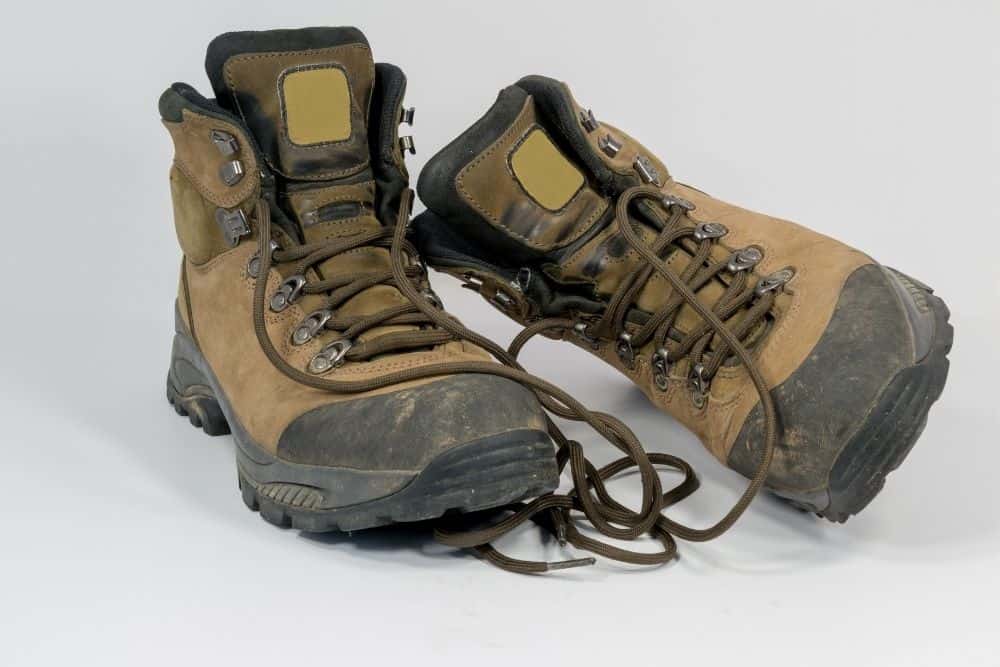
By now, you’re probably wondering which weight is suitable for your hiking trips. You already have a picture of how much energy you’ll spend lifting the different hiking boots.
So, which weight should you go for? It would be great if you decided based on the terrain you’re going hiking on. Plus, consider the weather conditions and the weight of your backpack.
You don’t need so much weight on easy hiking terrains, nor do you need heavyweight hiking boots during scorching hot weather. On the other hand, you would need heavyweight hiking boots for colder climates, challenging terrains, and longer hiking journeys.
2lbs or 3lbs is a considerable amount of weight for your hiking trips if you don’t want too much weight. That is, hiking boots above 3lbs may be too heavy.
Conclusion
When hiking, weight matters, especially when it comes to your boots. This is because it is best you don’t use up too much of your energy lifting all your weight, instead of getting to your destination.
We have helped you with the pros and cons of different hiking boots’ weight and how they can impact your hiking trips. Also, they can help you decide which one is suitable for various terrains and weather conditions.
You should choose a weight that fits the weather, terrain, and hiking duration. Finally, we hope we have answered your question. Have fun hiking on your next hiking trip.

